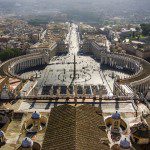She didn’t say if it was Lupe, Fatima or one of the other children living in the house who had been taken.
“They don’t have any memory of Mexico anymore; they came here as toddlers. They would die. Their father had to pay a coyotaje to get them back.”
I hoped the “coyotaje,” a smuggler paid to bring human beings into the country illegally, was kind to that child. Imagine the danger they’d face. Imagine if it was your child, making that journey with a stranger you knew was a criminal from the beginning. What if they hurt your child? What if they raped her? What if they weren’t who they said they were, and trafficked her to somebody else? What if they did their very best and another accident happened– what if your child drowned in the Rio Grande, or was shot, or died of thirst in the desert, or suffocated in the back of a truck?
This is the kind of choice that some parents have to make: abandon your baby, or make your baby an illegal immigrant. Keep your child hidden, or let them go to school and run the risk that they’ll be captured and sent to Mexico alone. Pay a total stranger to escort your child back over the border to safety, knowing that anything could happen on the way– or abandon them to die in a foreign country of which they have no memory, in which they have no friends.
I know that some of you will judge those parents harshly– they should have made the hard decision and chose to abide by the law. But, supposing you’re right, do you believe we ought to punish children for the sins of their parents? Lupe and Fatima did not commit a crime. Their parents committed a crime, under the worst of circumstances, and it’s a crime I think any one of us would have committed as well. But Lupe and Fatima did nothing wrong.
I don’t know where those beautiful, boisterous girls are right now. They’d be young adults by this time, working or going to college somewhere in this country– the only country they know. It could be that you know them. Maybe your own adult children go to college with them. Maybe they work where you do.
Today, our president made a decision that puts them in danger. The Deferred Action for Childhood Arrival program protected Lupe, Fatima and nearly eight hundred thousand other human beings– Americans in every way except on paper, our neighbors and friends, people who work and go to school in this country and have lived here for many years. DACA prevented them from being deported; it afforded them some safety and hope. Now, DACA has been scrapped.
“I do not favor punishing children, most of whom are now adults, for the actions of their parents,” wrote the president. “But we must also recognize that we are nation of opportunity because we are a nation of laws.”
Must we?
Are we a nation of laws, or a nation of people?
Which is more important?
What makes America great?
Is it laws, or is it human beings?
Laws, or families?
Laws, or boisterous little girls named for Our Lady who grew up to be Americans?
There is nothing wrong or unjust about nations codifying laws. But laws are instruments, only good insofar as they serve their purpose. The purpose of law is justice, ensuring that the rights of human beings are protected. That’s what laws are for. A law that is unjust, that abuses human beings, is no law at all– and every human of goodwill, particularly the Christian, has a duty to break that law in the name of justice. Whatever you think of President Obama, DACA was implemented to protect human beings from injustice– and that is just.
The United States Conference of Catholic Bishops has just issued a statement condemning the ending of DACA, as well they should. We must all join them in demanding a legislative solution to protect the hundreds of thousands of Fatimas and Lupes living in our midst.
(image via Pixabay)













